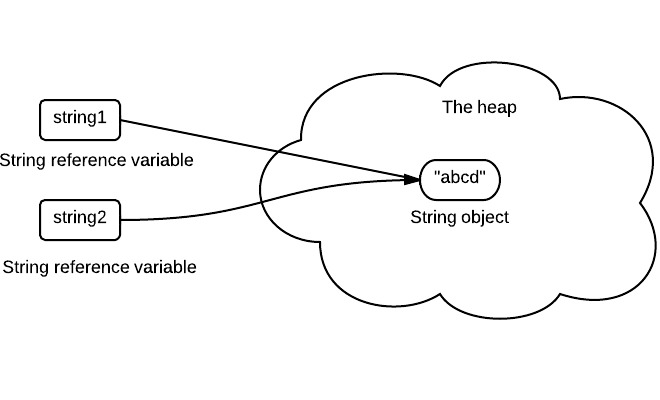Why Are Strings Immutable in Java? Understanding the Core Principles
Why Are Strings Immutable in Java? Understanding the Core Principles
Blog Article
Checking Out the Benefits of Unalterable Strings in Modern Shows Paradigms
In the realm of modern programming paradigms, the principle of unalterable strings stands as a keystone of robust software program advancement. The benefits they supply go beyond plain convenience; they fundamentally change the way data is taken care of within applications. By taking on immutable strings, developers can ensure improved information honesty, enhanced thread security, simplified debugging procedures, raised security procedures, and effective performance optimization. These benefits function as a testament to the extensive influence that welcoming immutability can have on the reliability and efficiency of software application systems.
Enhanced Data Integrity

By avoiding the modification of string objects, immutability gets rid of the risk of unintended changes to the information they hold. This not just enhances the security of the info but additionally boosts the reliability of the code that depends on these strings.
Immutability likewise supports much safer multithreading settings, as concurrent accessibility to immutable strings does not position the risk of information corruption through synchronised alterations. This home simplifies the procedure of managing strings in identical shows circumstances.
Essentially, immutability acts as a safety shield around the information kept within strings, improving their integrity by ensuring that as soon as specified, their worths continue to be the same throughout the program's execution.

Improved Thread Safety
Unalterable strings boost the string safety and security of programs by making sure that when a string item is developed, its value can not be customized. This residential property eliminates the threat of simultaneous threads trying to change the same string simultaneously, which might lead to data corruption or inconsistent states in the program - Why are strings immutable in Java?. In a multi-threaded setting, where multiple threads access and manipulate data concurrently, the immutability of strings provides a level of security by guaranteeing that the information stays unchanged throughout its lifecycle
Streamlined Debugging Processes
Provided the improved string security assisted in by unalterable strings, a significant advantage develops in the realm of simplified debugging procedures. Unalterable strings, as soon as created, can not be altered, making it simpler to map the flow of data and recognize the resource of bugs in a program. This immutability ensures that strings stay regular throughout the execution of the program, lowering the chance of unexpected modifications that could cause mistakes.
When debugging with mutable strings, developers typically run into problems where a string's value is modified accidentally, making it testing to identify the origin of an insect. However, with Find Out More immutable strings, the data continues to be unchanged, allowing programmers to concentrate on evaluating the real reasoning of the code as opposed to finding where and when a string was customized incorrectly.
In addition, immutable strings simplify the debugging procedure by making it possible for easier reproduction of bugs. Because unalterable strings do not transform state, designers can recreate and research pests extra properly, bring about quicker recognition and resolution of problems within the codebase. This structured debugging process eventually adds to higher software program high quality and boosted overall advancement efficiency.

Raised Safety Procedures
Enhancing data security and strengthening system honesty, the usage of immutable strings in software application applications contributes significantly to boosted safety and security actions. Unalterable strings additionally play a vital role in avoiding typical protection susceptabilities such as barrier overflows and SQL shot attacks, as efforts to control string data at runtime are inherently restricted.
In addition, the immutability of strings boosts the predictability of program behavior, making it easier to verify inputs and avoid unexpected adjustments that can compromise protection. This predictability simplifies the process of bookkeeping and verifying code, allowing designers to identify possible safety and security loopholes more efficiently. Generally, including unalterable strings right into software click here to find out more application growth practices not only boosts the toughness and reliability of applications yet likewise reinforces their strength against safety dangers.
Effective Efficiency Optimization
When dealing with mutable strings, procedures like concatenation or substring production often result in the development of new string things, leading to memory expenses and increased processing time. By enabling strings to stay constant and stable, unalterable strings promote far better memory monitoring and caching opportunities, ultimately boosting the general efficiency of the software program.
Since immutable strings can not be customized once developed, they can be shared throughout strings without the threat of unforeseen changes, decreasing the requirement for synchronization systems and enhancing concurrency. Immutable strings simplify debugging processes as developers can rely on that a string's value will stay consistent throughout the program's execution, getting rid of potential mistakes caused by mutable state adjustments.
Conclusion
In verdict, the advantages of utilizing unalterable strings in modern programs paradigms can not be overemphasized. Boosted information honesty, boosted string safety, streamlined debugging processes, increased security procedures, and efficient efficiency optimization all add to the overall effectiveness of programs jobs. By incorporating unalterable strings into programs practices, developers can take advantage of a more reputable and durable codebase.
Immutability, a crucial function of strings in programming languages such as Java and Python, makes certain that as soon as a string object is created, it can not be modified or changed.Unalterable strings enhance the thread security of programs by making certain that once a string object is created, its worth can not be changed. Immutable strings likewise play an essential role in stopping common safety and security susceptabilities such as linked here buffer overflows and SQL shot strikes, as efforts to manipulate string information at runtime are naturally restricted.
By permitting strings to stay unchangeable and consistent, unalterable strings promote far better memory administration and caching opportunities, ultimately boosting the total effectiveness of the software.
Immutable strings streamline debugging procedures as developers can trust that a string's value will certainly remain regular throughout the program's execution, getting rid of potential mistakes caused by mutable state adjustments.
Report this page